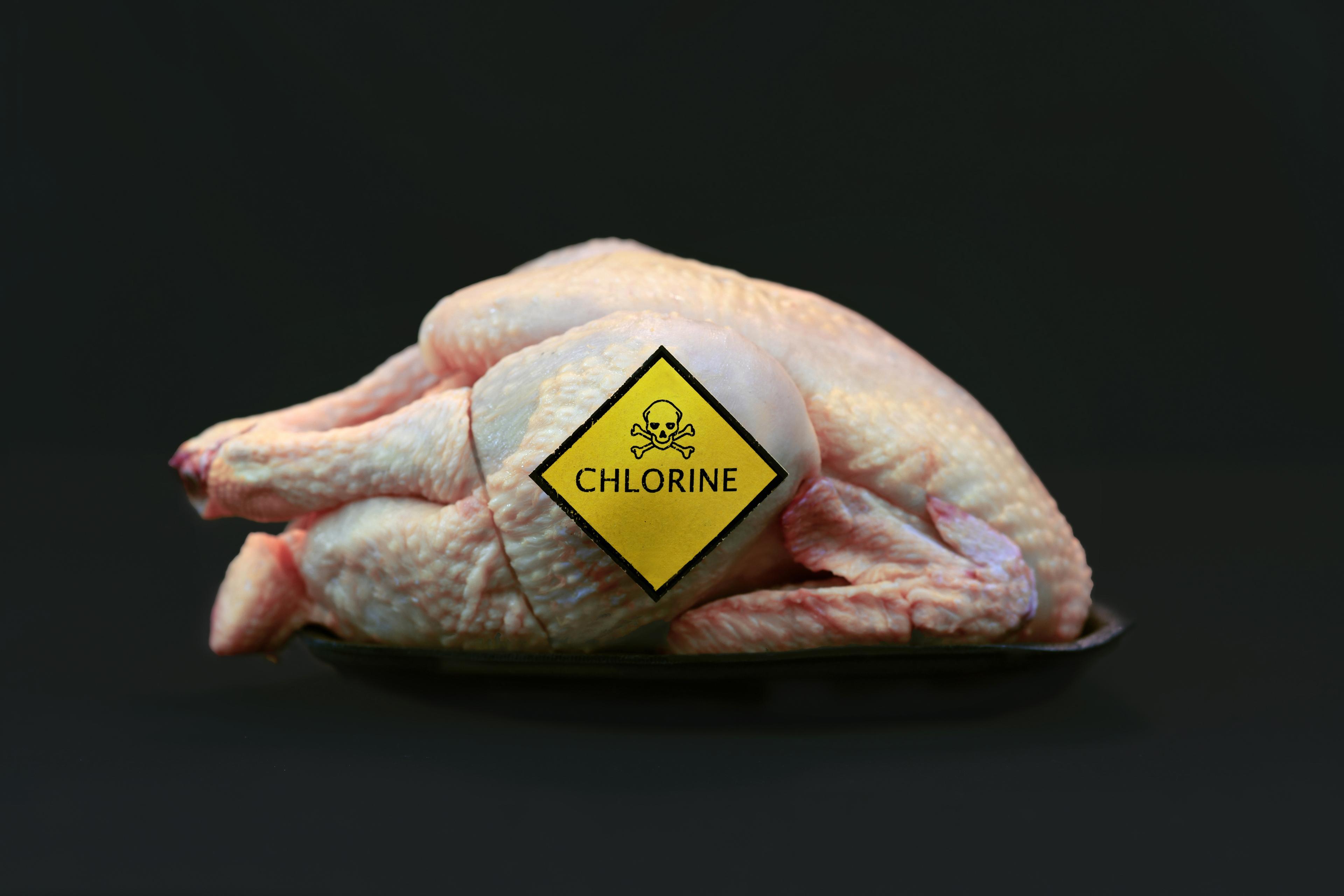Chlorinated chicken and why it matters for animal welfare
By Kate Parkes, farmed animal welfare scientist, RSPCA

You may have heard the term chlorinated chicken in the news or on social media and wondered what all the fuss is about.
As the RSPCA’s chicken welfare scientist, I want to take you behind the headlines.
It’s not just about a chemical wash – it’s about the welfare of the chickens on the farm and the quality of their lives.
Chlorinated chicken refers to poultry washed in a chlorine solution during processing.
This is a method commonly used in the USA to reduce bacteria on chicken meat.
On paper, it might sound good for food safety. But as someone who spends my working life looking at how chickens are raised and cared for, I can assure you: the real problem isn’t the chlorine itself – it’s what it represents.
Using chlorine is a way to ‘clean up’ the meat at the end of the process, rather than making sure chickens are healthy and well cared for throughout their lives.
It can mask poor hygiene on farms, and more importantly, low animal welfare standards.
Is chlorinated chicken allowed in the UK?
The short answer is no. Chlorine-washed chicken is banned in the UK – and across the European Union (EU). Here, only cold air or water is used to clean chicken meat.
The UK and EU follow the farm-to-fork principle. This means basic hygiene and welfare standards are maintained at every stage – from before the chick is hatched to the moment the chicken reaches your plate.
That means better food safety throughout – and most importantly, better welfare for the chickens.
Why is it banned?
The main reason chlorinated chicken isn’t allowed here is animal welfare.
On the majority of farms in the US, chickens are reared in overcrowded sheds, from faster-growing chicken breeds which often struggle to walk or even stand properly.
Hygiene and biosecurity (the steps taken to stop diseases spreading) can be poor, so chlorine washing is used to kill bacteria after the chickens are slaughtered.
Chlorinated chicken has been banned in the UK (kept from EU law) and across the EU since 1997, as it’s seen as a quick fix that masks lower welfare and food safety standards.
Banning it has helped maintain higher welfare and food safety standards.
Is chlorinated chicken safe to eat?
US regulators say yes. The European Food Safety Authority has also said chlorine residues on chicken aren’t likely to harm consumers.
But safety isn’t the only issue. Chlorine rinses can create by-products that may harm the environment.
And most importantly, washing meat doesn’t solve the root problem: how chickens are cared for during their lives.
What could happen if it were imported?
If chlorinated chicken were allowed into the UK, it could undercut farmers who work hard to maintain higher welfare standards.
It could also confuse shoppers and reduce trust in food labelling.
As someone who visits farms regularly, I know every chicken deserves a life where it can move freely, peck, scratch and behave naturally.
Although I’m sad to say not every chicken in the UK has this, we can’t let standards slip even further.
The RSPCA’s view on chlorinated chicken
We firmly believe chlorine washing is not the answer.
The best way to keep food safe is by ensuring high standards of welfare and hygiene throughout the whole farming process – not by trying to fix problems afterwards.
Even though chlorine washing isn’t allowed in the UK, not all chickens in the UK are reared to higher welfare standards.
However, on RSPCA Assured-certified farms:
- Chickens are slower-growing, healthier breeds
- They have more space than the law requires
- They’re given perches and objects to peck at to encourage natural behaviour
- Indoor chickens have natural daylight, and free-range birds also have shade and shelter outdoors.
As someone who sees these farms first-hand, I can tell you: these chickens live better lives.
How you can help
Right now, chlorinated chicken is banned in the UK – however, it could be debated again in the future.
You can protect higher welfare standards – and support British farmers – by looking for the RSPCA Assured label when you shop.
Every time you shop, you have the power to support higher welfare farming and ensure chickens live better lives.
For me, that’s the part that really matters: keeping welfare front and centre in the decisions we make as consumers.
Frequently asked questions
What’s chlorinated chicken?
Chlorinated chicken is poultry washed in a chlorine solution during processing to reduce bacteria. It’s common in the US, but banned in the UK and EU.
Why is chlorinated chicken banned in the UK?
The UK bans it primarily for animal welfare reasons. Chlorine washing can hide poor conditions on farms.
How does RSPCA Assured ensure chicken welfare?
RSPCA Assured members use slower-growing breeds, give chickens more space, provide enrichment and put strict measures in place to prevent the spread of disease.
Monday 22 September 2025